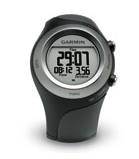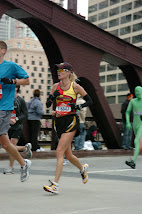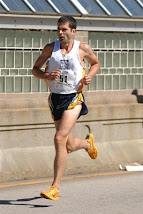 People make fun of me when I travel and they see the regimen of supplements I take every morning. Actually, all day long it takes me to spread things out, take multiple doses, etc. I guard my secret mixture, both in contents and quantity, because I really do believe some of what I take gives me a competitive edge (in addition to just helping me stay healthy or make up for a lack in diet).
People make fun of me when I travel and they see the regimen of supplements I take every morning. Actually, all day long it takes me to spread things out, take multiple doses, etc. I guard my secret mixture, both in contents and quantity, because I really do believe some of what I take gives me a competitive edge (in addition to just helping me stay healthy or make up for a lack in diet).But, there is one supplement in particular I take that is getting a lot of attention lately. For the record, I've been taking it in high doses long before it was "cool." It could be the most powerful supplement I take, impacting my health, athletic performance and is a key factor in my injury prevention. And if you aren't taking it yourself, you should add it to your mornings (and quite possibly evenings) as well. What is it?
Vitamin D. It's not just for your bones. After Deena Kastor's bone cracking injury in mile three of Beijing in 2008, and subsequently testing positive for a Vitamin D deficiency, it is widely known in the athletic community that Vitamin D is essential for calcium absorption and an important preventative for stress fractures. But, new evidence suggests there are other reasons athletes should be taking high doses (some sources suggest up to 2,000 IU per day if you are getting little to no sunlight).
"Activated Vitamin D is a steroid hormone that regulates over 1,000 human genes. Recent research indicates intracellular Vitamin D levels in numerous human tissues, including nerve and muscle tissues are increased when inputs of its substrate, the prehormone Vitamin D, are increased. A consistent literature indicates physical and athletic performance is seasonal; it peaks when Vitamin D levels peak [due to ultra-violet ray exposure in sun light], declines as they decline, and reaches its nadir when levels are at their lowest." (Source)
"Although few studies have looked closely at the issue of Vitamin D and athletic performance, those that have are suggestive. A series of strange but evocative studies undertaken decades ago in Russia and Germany, for instance, hint that the Eastern Bloc nations may have depended in part on sunlamps and Vitamin D to produce their preternaturally well-muscled and world-beating athletes. In one of the studies, four Russian sprinters were doused with artificial, ultraviolet light. Another group wasn’t. Both trained identically for the 100-meter dash. The control group lowered their sprint times by 1.7 percent. The radiated runners, in comparison, improved by an impressive 7.4 percent." (Source)
"More recently, when researchers tested the vertical jumping ability of a small group of adolescent athletes, Larson-Meyer says, “they found that those who had the lowest levels of Vitamin D tended not to jump as high,” intimating that too little of the nutrient may impair muscle power." (Source)
Even training outside, you might not get enough: "[Earlier this year,] researchers found that many of a group of distance runners also had poor Vitamin D status. Forty percent of the runners, who trained outdoors in sunny Baton Rouge, Louisiana, had insufficient Vitamin D." (Source)
It's a simple, inexpensive add to your routine, and well worth it. Hmm... or, maybe we should all organize a week-long sunny, tropical cruise during the winter just for runners! It's 15F here this morning. Brr.








Hi Alex,
ReplyDeleteI TOTALLY agree with you about Vitamin D. After my two stress fractures, my endocrinologist put me on 2000 iu's of Vitamin D daily. I really believe that it has tremendously helped my recovery. I know that ideally we should get all our vitamins/minerals from a healthy diet, but sometimes it is just not possible. I am a firm believer in supplementing my diet with, well, supplements! In addition to my daily Vitamin D I am also taking Calcium (obviously!!) and a multi-vitamin. Any other recommendations? :)
Sharon, There's a bunch I take, but the ones I swear by the most are: Calcium, Vit. D, Vit. C, Zinc, Fish Oil, Vit. K, Vit. E and Quercetin. If your hemoglobin is low at all, I recommend iron occasionally. But that can be bad if you don't truly need it. Best to get a test first and find out your blood levels. --Alex
ReplyDeleteYeah, Vitamin D is what is holding me together, at least through houston!
ReplyDeleteHey, Bill! You're going to rock Houston. Sounds like your workouts are really coming together :-) 2010 is going to be your year! Tell my cuz Al hello for me :-) --Alex
ReplyDeleteAnother advocate for Vitamin D here. At my first appointment diagnosing stress fractures one of the doc's main recommendations: add Vitamin D.
ReplyDeleteThanks for the visit, Lorraine! How are you doing? Any exciting new goals for 2010? --Alex
ReplyDelete